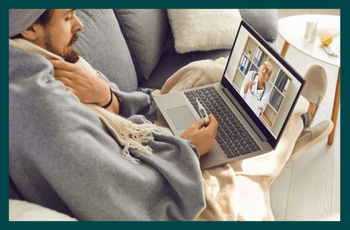What To Use A Telehealth Consult For And When To Visit Your GP Physically?
Written by Sai Pragna Chagarla, Writer at Hola Health Medically Reviewed by Dr Nelson Lau - MBBS FRACGP, GP & Digital Health Specialist

Contents

The Advent of Telehealth in Australia
Telehealth vs. Face-To-Face Visits
Telehealth Consultations:
- Convenience: Provides convenient access to healthcare services from the comfort of home or any location with internet access. This eliminates the need for travel and waiting room times. You can now apply for a medical certificate online or get online pharmacy delivery.
- Accessibility: Telehealth overcomes geographical barriers, enabling patients in remote or underserved areas to connect with healthcare. It enhances access to specialists and reduces disparities in healthcare delivery.
- Timeliness: Telehealth often offers shorter wait times for appointments, facilitating prompt access to medical advice, diagnosis, and treatment recommendations.
- Round-the-clock Care: Most telehealth services are operating 24/7. This means that you can easily get an after-hours appointment or weekend healthcare without visiting a clinic at odd times.
- Cost-Effectiveness: Telehealth can be more cost-effective for patients, eliminating travel expenses and reducing time away from work.
- Secure and safe: Most telehealth providers adhere to patient confidentiality protocols. They enable secure telehealth payments and services.
- Continuity of Care: Telehealth supports ongoing communication between patients and healthcare providers, facilitating continuity of care. It enables follow-up appointments, medication management through telehealth prescriptions, and monitoring of chronic conditions remotely.
Face-to-Face Visits:
- Direct Observation: Healthcare providers can directly observe patients’ symptoms during in-person visits, facilitating a better understanding and assessment of their health status. This is especially needed for certain conditions that cannot be diagnosed online such as appendicitis or heart failure
- Personal Connection: This fosters a sense of trust, empathy, and rapport between patients and healthcare providers. Personal connections build a strong patient-healthcare provider relationship and are effective for communication, shared decision-making, and patient satisfaction. This will also make follow-up appointments easier as the doctor is aware of the patient’s history.
- Emergency Care: In emergencies or urgent medical situations, in-person visits to healthcare facilities are essential. This enables prompt evaluation, stabilisation, and treatment. Immediate access to medical care can be lifesaving in critical situations.
- Diagnostic Procedures: Getting diagnostic procedures, or patients with complex medical concerns and who require procedural care will benefit from in-person visits.
When to Book a Telehealth Appointment?
- Routine Medical Queries: Telehealth Appointments are suitable for addressing routine medical concerns, such as medication refills, minor ailments (e.g., colds, coughs, flu, allergies), and general health inquiries.
- Chronic Disease Management: Patients with chronic conditions (e.g., diabetes, blood pressure, asthma) can benefit from regular telehealth appointments for medication management, symptom monitoring, and lifestyle recommendations.
- Follow-Up Appointments: Telehealth appointments are ideal for follow-up visits to review treatment progress, discuss test results, and address any ongoing health concerns identified during previous consultations.
- After-Hours Care: It is now easy to get an online appointment during after-hours or weekends.
- Non-Emergency Care: For non-urgent medical issues that do not require immediate physical examination or intervention, such as rashes, mild infections, or mental health consultations, telehealth appointments offer a convenient alternative to in-person visits.
- Medical Certificates: You can apply for a single-day or multi-day medical certificate online within 15 minutes, 24/7.
- Online prescriptions: You can apply for an eScript for single or multiple medications, and refills online.
- Preventive Care: Telehealth appointments can be used for preventive health screenings, and counselling on healthy lifestyle habits (e.g., diet, exercise, smoking cessation, alcohol disorders).
- Mental Health Support: Telehealth appointments are valuable for mental health consultations, therapy sessions, and counselling services, providing accessible and confidential support for individuals experiencing anxiety, stress, depression, or other mental health issues. You can get a Mental Health Treatment Plan online or speak with a telehealth psychologist.
- Referrals: Patients can get pathology referrals, radiology referrals, specialist referrals, Blood test referrals, X-ray, or MRI referrals through telehealth consults.
- Accessibility Needs: Telehealth appointments offer convenience and accessibility for individuals with mobility limitations, and transportation barriers, or those residing in rural or remote areas where in-person healthcare services may be limited.
When to Physically See a Doctor or GP?
- Physical Examination: Conditions requiring hands-on assessment, palpation, auscultation, or visual inspection, such as abdominal pain, chest pain, injuries, or suspicious skin lesions, warrant an in-person visit for comprehensive evaluation.
- Diagnostic Testing: Certain diagnostic tests and procedures, such as blood tests, X-rays, ultrasounds, or biopsies, cannot be performed remotely and require patients to visit a healthcare facility.
- Emergencies: Medical emergencies, including severe injuries, chest pain, breathing difficulties, sudden onset of severe pain, or symptoms of stroke, require immediate evaluation and treatment in person at an emergency department.
- Procedures: Medical procedures such as vaccinations, injections, wound care, suturing, or minor surgeries necessitate in-person visits to ensure proper treatment delivery, monitoring, and patient safety.
- Complex Medical Concerns: Patients with complex medical histories, undiagnosed symptoms, or acute illnesses may require comprehensive evaluation and management.
- Physical Therapy or Rehabilitation: Physical therapy sessions, rehabilitation exercises, or hands-on treatments for musculoskeletal injuries or conditions often require in-person visits to a physical therapist or specialist.
- Prenatal Care: Pregnant individuals require regular prenatal check-ups and obstetric care, including physical examinations, foetal monitoring, and ultrasound scans.
- Preventative Care: It is important to get regular physical check-ups even in the absence of symptoms as part of preventive healthcare which is not fully achievable via telehealth.
Feeling sick and unsure why? Speak with a GP online in 15 minutes.
Feeling sick and unsure why? Speak with a GP online in 15 minutes.
Reference
- Australian Communications and Media Authority – How we use the internet – Key Summary findings: Reference Link
- Australia National Digital Health Strategy: Reference Link
- Internet Activity Australia – Australian Bureau of Statistics: Reference Link
- Australian Department of Health and Aged Care: Reference Link
- Hall Dykgraaf S, Desborough J, de Toca L, Davis S, Roberts L, Munindradasa A, McMillan A, Kelly P, Kidd M. “A decade’s worth of work in a matter of days”: The journey to telehealth for the whole population in Australia. Int J Med Inform. 2021 Jul;151:104483. doi: 10.1016/j.ijmedinf.2021.104483. Epub 2021 May 7. PMID: 33984625; PMCID: PMC8103781.
- Ashley C, Williams A, Dennis S, McInnes S, Zwar NA, Morgan M, Halcomb E. Telehealth’s future in Australian primary health care: a qualitative study exploring lessons learnt from the COVID-19 pandemic. BJGP Open. 2023 Jun 27;7(2):BJGPO.2022.0117. doi: 10.3399/BJGPO.2022.0117. PMID: 36750374; PMCID: PMC10354397.
- Telehealth – Digital Health. Gov: Reference Link
What we treat
- Cough
- Nausea & vomiting
- Fever
- Hayfever
- Fatigue
- Sore throat
- Acne
- Hair loss
- Gout
- Eczema
- Rosacea
- Sunburn
- UTI
- Erectile dysfunction
- Contraception
- Morning sickness
- Morning after pill
- Prostate health
- Anxiety
- Depression
- Stress
- Grief & loss
- Antidepressants
- Premature ejaculation
- Asthma
- Blood pressure
- Blood thinners
- Diabetes
- Cholesterol
- Migraines & headaches
- Allergies
- Body ache
- Heartburn & reflux
- Sleep disorder
- Pain relief
- Gastro
Related Articles
Disclaimer
This blog is for general informational purposes only and does not indicate that Hola Health provides all treatments or preventive measures mentioned. It is not intended to be a substitute for professional medical advice. Always seek the guidance of your doctor or other qualified health professional with any questions you may have regarding your health or a medical condition. For emergencies please immediately contact 000. Any medical topics discussed are intended to educate, not to imply availability through Hola Health.

Get affordable healthcare on your terms, with quick access to qualified, Australian-registered telehealth doctors & health practitioners, 24/7, 365 days a year. No more searching for ‘doctors near me‘ – Hola connects you instantly.
Address: 79 St Georges Terrace, Perth WA 6000


Hola Health App
Get affordable healthcare on your terms, with quick access to qualified, Australian-registered telehealth doctors & health practitioners, 24/7, 365 days a year. No more searching for ‘doctors near me‘ – Hola connects you instantly.
Call 000 for emergency or urgent medical help.
Address: 79 St Georges Terrace, Perth WA 6000
© Hola Health, a brand of Packapill Pvt Ltd


 Facebook
Facebook  X
X  Copy Link
Copy Link











